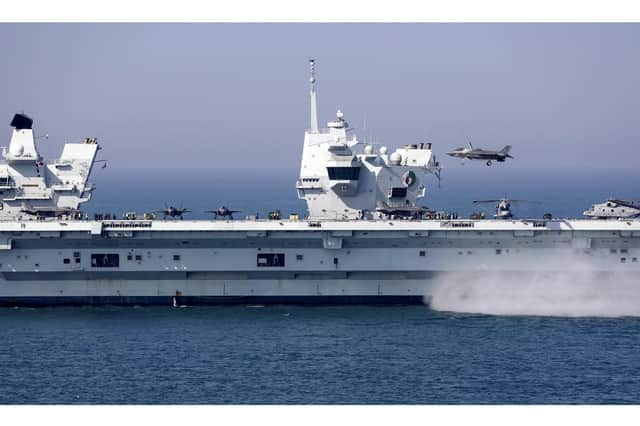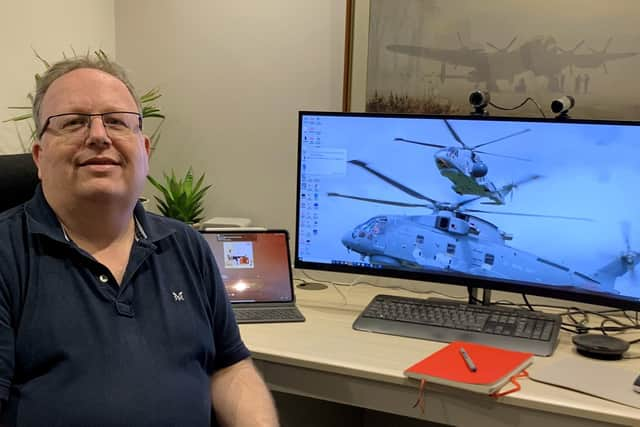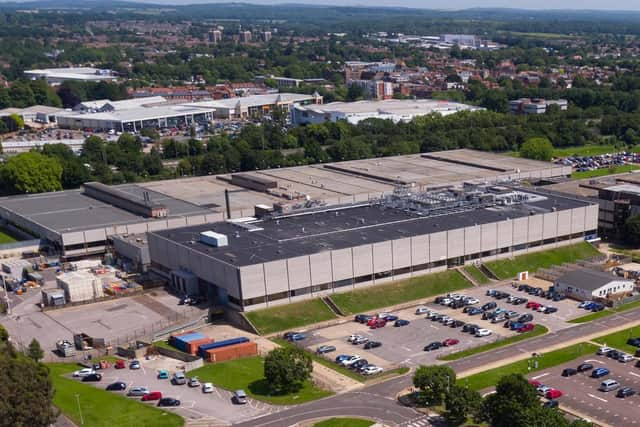Lockheed Martin UK: We're proud to be part of this country's most important defence programmes


Because their hard work behind the scenes has played a vital role in ensuring the helicopters and jets that will be embarked on board the £3.2bn leviathan are ready for action.
Emlyn Taylor, Programme Delivery Director for the company’s Rotary and Mission Systems (RMS) division, says: ‘When the carrier sails, the Merlin Mk2 helicopter and the F-35 Lightning II fast jet will play a significant part in Carrier Strike Group 21.’
CSG 21 is a task force led by HMS Queen Elizabeth that is being readied to deploy to the Indo-Pacific.


It was back in 1991 when Lockheed Martin (then IBM Federal Systems) was awarded the contract to deliver 44 Merlin Mk1 helicopters to the Royal Navy and established a base here – although by then the company had already operated in this country for nearly 50 years.
At the time, it was the UK’s largest-ever and most sophisticated systems integration project undertaken for the Ministry of Defence.
Fast forward 30 years and the Merlin programme still plays an integral part in Lockheed Martin UK’s business.
In 2017, the company was awarded a £269m contract to deliver the Royal Navy’s Crowsnest Airborne Surveillance and Control programme, which is integrated into the Merlin Mk2 helicopter.


As the prime contractor, Lockheed Martin UK is responsible for the overall design and development of Crowsnest, which will provide a vital surveillance capability to support both the new Queen Elizabeth Class carriers.
Emlyn explains: ‘The carriers are strategic assets for this country, but they are also a big target if someone wants to come after you, so they need to be adequately protected.’
Paul Livingston, vice president and group managing director of RMS, adds: ‘It is commonly quoted that we have the best anti-submarine warfare helicopters on the planet.
‘Crowsnest is a radar system that can be fitted to a Merlin Mk2 helicopter with the aim of being the eyes and ears of a carrier.’


The team at Havant also directly contributes to and supports the Lightning Enterprise at RAF Marham.
Emlyn says: ‘We stand by to help ensure the jets are fit to fly and ready to be used.’
Both the jets and the helicopter-borne surveillance and intelligence provided by Crowsnest are seen as integral to the UK’s Carrier Enabled Power Projection (CEPP) capabilities.
CEPP will allow greater flexibility in responding to conflicts, engaging with allies and supporting humanitarian relief efforts around the world.


Lockheed Martin UK is this country’s arm of the global aerospace and security company the Lockheed Martin Corporation, which has its headquarters in the USA. It employs approximately 1,800 people at more than 20 sites across the country.
The RMS division is based at Langstone Technology Park in Havant and plays a central role in delivering and maintaining capability for the Royal Navy and the other armed forces.
Paul says: ‘We massively value our relationship with the Royal Navy and are very proud of the connection. Portsmouth’s maritime heritage means there is nowhere else quite like it.
‘That’s why the company has a base at Havant, because we are part of the ecosystem that helps to support the navy.’
Emlyn says: ‘Our people have a real sense of purpose. They’re not just writing software. When they see those in our armed forces doing extraordinary things for the country, it motivates them.
‘If a mission requires it, they will work overtime and weekends. I don’t need to ask them.’
Paul adds: ‘A good percentage are veterans who have an affinity with the armed forces. But no matter what their background, our people are proud to work on projects that are of great national significance.’
But defence is just one part of the business locally. As well as logistics and support, navigation and radar systems and running military training programmes, RMS is also involved in technology integration for postal services around the world.
This ranges from sortation and machine learning to automation – transforming operations and improving efficiency and competitiveness during the rise of e-commerce-based mail volumes.
Emlyn says: ‘Back in 2000 the Royal Mail had 60 million envelopes a day to deal with and a system that hadn’t changed for hundreds of years. They had to find a way to automate the process.
‘It looked like an impossible challenge, but we created software that could read addresses and stamps - things humans take for granted - in real time and with great accuracy.’
One advantage that Lockheed Martin UK has over other local defence contractors is the unique ability to draw upon the wider corporation for proven technologies that can be further developed and managed in the UK.
Integration also means it has a very flexible workforce. Paul, who next month becomes chief executive of the whole company in this country, explains: ‘All our engineers are effectively in one big pool.
‘With all the IT tools we have and remote working, employees based at Havant can work on programmes at other sites around the UK without needing to relocate.
‘We’ve created a more flexible workforce and given people the ability to try new things and learn new skillsets.’
He adds: ‘We don’t just take people who have always worked in the defence industry or who have an aerospace degree.
‘We need diversity of thought to be able to solve complex problems. One of our best programme managers used to run a dance school.’
Emlyn says: ‘Today we have the ability to virtually send people where the work is. We have people at Havant working on programmes in Scotland and the Midlands as well as the south coast.’
Business development director Chris Harrison, who joined Lockheed Martin UK in 2018 after a career in the army, says there is great optimism about the company’s future.
‘We have built a very solid foundation. Defence is pivoting towards a different threat environment – we are seeing growth in the training side of our business, plus the cyber area.
‘I think we’ll see a transitioning period for the business over the next 5-10 years, with a focus on AI, autonomy and unmanned systems.
‘The navy has appointed a chief technical officer and it’s looking to do things in very innovative ways.’
Paul adds: ‘This is a really exciting time to be in RMS. We are the glue that can bring things together, as well as bring new solutions and capabilities.
‘We’ve seen the MoD secure a significant settlement for multi-year defence spending. That enables us and our customers to sit down and plan together.
‘We’ll continue to operate across the UK, but I think we’ll become more of a virtual business. I see a more flexible working environment, where people work from home and our offices become somewhere you go only when you need to collaborate.’
To find out more about Lockheed Martin UK, go to https://www.lockheedmartin.co.uk
‘I love living in England - but I still miss watching the ice hockey’
Murray Diamond began working for Lockheed Martin as a cost accountant in Montreal back in 1984. His first role was looking after the figures on a frigate programme for the Canadian navy.
In 1999 he and his family made the move to the UK when he was appointed chief financial officer of Lockheed Martin’s UK operation.
He explains: ‘The programme in Canada had included helicopters and Lockheed Martin UK had won a big contract to build Merlin helicopters for the Royal Navy.
‘I first came over here on a three-year assignment, which then turned into five years. I thought ‘’holy mackerel, I wasn’t planning on that!’’’
But he quickly grew to love life in this country and now has joint British and Canadian citizenship. Today Murray, 64, is still CFO and lives in Titchfield with wife Karen and their pet rabbit Crayons.
In 1999 there were 50-60 Americans who had come over to work for Lockheed Martin UK and Murray was the only Canadian. He remembers being made to feel very welcome in this country.
‘We were allowed to vote before becoming British because we were members of the Commonwealth and the Queen was our head of state. I felt so honoured by that.
‘People have also been so friendly. Once they know you they will always help you out.’
So how has the company changed in his time at CFO?
‘When I first got here there was primarily the large Merlin contract, but today we have many other diverse programmes serving the Ministry of Defence, the Royal Navy and the Army. The spectrum is much wider than it was and that has made the job more interesting.’
He adds: ‘I still consider myself new, although I’ve been here 22 years now. I do still miss parts of Canada, but we’re lucky there’s so much to see and do where we live.
‘I miss the ability to go skiing at the weekend and I miss watching the Montreal Canadians - although there’s another Canadian who works in finance now so we can talk about the ice hockey!’
‘You don’t have to go down a certain path’
There can’t be many people who’ve gone from being a holiday rep in Ibiza to working on radar systems for the Royal Navy.
Holly Stratford’s career has certainly been varied - but she couldn’t be happier with her present role.
In October last year the 29-year-old began a new job as a system integration test engineer with Maritime Solutions for Lockheed Martin UK, based at Langstone Technology Park in Havant.
She explains: ‘We test computer software and try to find any defects or problems.Then we can go to the customer and give them reassurance that everything is as it should be.
‘If you think of an app on a phone, then it gets tested before it goes into production. That’s what we do.’
Holly, who grew up in Denmead and now lives in Waterlooville, adds: ‘My role with Lockheed Martin UK is very varied. The best thing for me is that I can get very hands-on with systems.
‘I’ve already learned so much and enjoy being able to see the end result. At the end of this month there are ship trials as part of the navigation radar programme we’ve been working on for the RFA (Royal Fleet Auxiliary) and I’ll get to go on board.’
She didn’t go to college or university, instead starting work at 17 with a travel agent. The job took her abroad, including a year in Ibiza - ‘in the family area’, she says - plus a ski season at La Plagne in France.
Holly then joined an energy company and worked in sales before moving into IT and finding her present role.
She says: ‘Where I was prior to joining Lockheed Martin UK, I was the first person they’d employed who didn’t have a degree.
‘But I think my people skills have helped me and people have believed in me as a person rather than just look at my technical ability.’
Holly adds: ‘A lot of people think you have to be good at maths to go into IT, but I scraped a C in my GCSEs. System testing can be a job for anyone who has common sense and questions things.
‘The company has been so supportive. They knew I had no prior maritime or radar experience and I wasn’t just chucked in at the deep end.
‘I would like my story to inspire others, to show that you don’t always have to go down a certain path or fit a certain mould. My catchphrase is "be unapologetically you”.’
In her spare time Holly is fundraising for Homestart Havant, which provides a support network for families with children up to age 11.
With Lockheed Martin UK matching every pound she raises, so far she’s up to £850. Another way she’s helping is by filming storytelling videos for children on Home Start’s YouTube channel.
Lockheed Martin UK is committed to community outreach
As a large company based in the Portsmouth area, Lockheed Martin UK is committed to involvement in a number of outreach activities.
For decades it has been delivering STEM activities within local schools, as well as encouraging employees to take part in community outreach during their free time.
During 2020 and into 2021, a number of activities were put on pause because of COVID-19, but where possible these were moved to a virtual setting as STEM remained at the forefront of the business.
The company has strong links with UTC Portsmouth and Portsmouth Grammar School, delivering STEM events in the form of the Merlin Engineering Challenge, but also attending apprenticeship and careers fairs.
A group of graduates involved in the Women and Allies in STEM group are delivering career sessions to Year 12 students at UTC.
Here is a snapshot of events over the years that have allowed Lockheed Martin UK to strengthen relationships in the community and inspire the next generation workforce.
Merlin Engineering Challenge
One of the company’s longest-running activities and takes place twice a year. Delivered to a total of 120 students (at Portsmouth Grammar School and 10 other city school teams) by a group of eight company engineers. Teams are tasked to design, build and test a system required to rescue a Merlin Mk2 helicopter that has made a forced landing in desert conditions.
UTC Portsmouth support
During UTC Portsmouth closures due to COVID-19, Lockheed Martin UK has partnered with the college to restock supplies, enabling it to use 3D printers to produce 42 visors per day for two weeks.
The Women and Allies in STEM group has also supported the following activities for UTC:
Regular support partnership meetings
UTC judging for the Merlin challenge
Virtual ‘Teach the Teacher Day’ with UTC
Careers lunches
Prepared for a UTC Work Experience Week just before lockdown 2020
Plans to hold a virtual event for UTC off the back of a successful Tech the Teacher event
Greenpower Goblin
Lockheed Martin UK sponsors the Greenpower Goblin Regional Heats at HMS Excellent every year. The Greenpower Education Trust challenges young people to design, build and race a single-seat electric car in an exciting hands-on project.
Community First Volunteering
Working with Community First, the company participates in four volunteering events with staff each year. Outreach activities include painting and decorating at community centres, beach cleans and gardening.
Think Kits/STEM Activities with Smallpeice
A new venture, providing four Think Kits, supplied by Smallpeice, to local schools as an extension of their curriculum. In conjunction with Smallpeice, the company will also be supporting school cyber activity days.
As part of a media partnership, this year www.portsmouth.co.uk will be featuring a series of articles about Lockheed Martin UK and the people who work there.